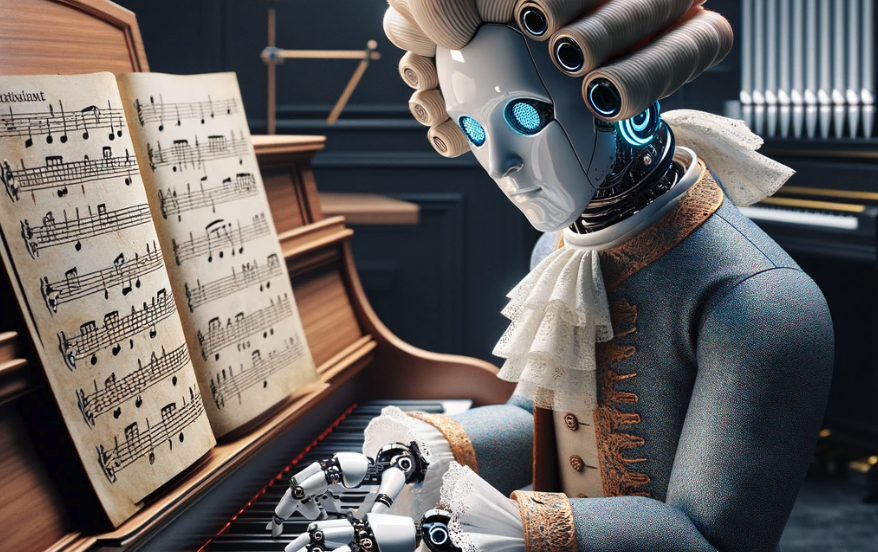. .
BLOG
AI Revolution in Fashion - 5 Trends and Applications of 2024

Artificial Intelligence (AI) is reshaping the music landscape in increasingly innovative and surprising ways. From composing new tunes to personalizing the listening experience, AI is opening up new horizons in the creation and consumption of music. This technological revolution has not only expanded the capabilities of musicians and producers, but is also changing the way audiences interact with music. In this rapidly evolving landscape, AI is emerging as a key player, with the potential to transform every aspect of the music world, from composition to distribution and beyond. With applications ranging from AI-assisted music generation to sentiment analysis and personalized recommendations, we are witnessing an era where technology and creativity are merging in a symbiotic ballet of innovation.
Today, on the LFM blog we are talking about composition and production, focusing on two tools that have caught our attention: AIVA and Jukedeck.
AI in Composition and Production
The advent of artificial intelligence (AI) is bringing a real revolution to the field of music composition and production. AI-based tools, such as AIVA (Artificial Intelligence Virtual Artist) and Jukedeck , are opening new frontiers in music creation, offering unprecedented possibilities to artists of all genres. AIVA and Jukedeck, in fact, represent two significant examples of how AI is transforming the creative process in music.
AIVA, for example, is an AI system that has even been recognized as a composer by SACEM (French Society of Authors, Composers and Publishers of Music). This software uses deep learning algorithms to analyze classical music scores and generate new compositions that respect classical music theories.

AIVA’s composition process begins by feeding the system a vast library of classical music. The AI then analyzes these compositions to understand patterns, harmonies, and structures, and uses this information to create new melodies. The result is music that, despite being computer-generated, has the depth and emotional complexity of human-composed pieces.
On the other hand, Jukedeck focuses on producing more modern music , such as pop, rock, and even electronic music. This AI tool allows users to create unique tracks by specifying certain parameters such as genre, tempo, and duration. Jukedeck then calculates the various components of the track, from melody to percussion, producing a complete piece that can be used for videos, games, or any other creative project.
Founded by Ed Rex, a musician and former University of Cambridge student, Jukedeck uses advanced machine learning algorithms to compose music. The idea behind Jukedeck is to make music creation more accessible by providing a tool that can quickly produce custom music for a variety of uses, from commercials to YouTube videos.
Jukedeck uses deep learning techniques to analyze musical structures and generate new tracks. Users can customize their music by selecting genre, mood, duration, and other parameters. The system then processes this information and creates a unique composition, which can be downloaded and used for various creative purposes.

Jukedeck has many applications. Digital content creators can use Jukedeck to quickly generate soundtracks for their videos, while game developers can find Jukedeck a useful tool for creating background music. Marketers also find value in Jukedeck, using it to produce music for advertising campaigns without having to worry about copyright issues.
One of the main advantages of Jukedeck is the speed with which it can produce music. It also offers a cost-effective solution for those who may not have the resources to hire composers or purchase music licenses. Jukedeck’s innovation lies in its democratized approach to music creation, making it accessible to anyone, regardless of musical skill.
Despite its success, Jukedeck faces challenges, particularly in the emotional quality and depth of its compositions. While AI can generate technically sound music, the question of whether it can match the human touch remains open. Additionally, the issue of copyright and intellectual property in an era of AI-generated music continues to be a topic of debate.
In short, the use of AI in music composition and production opens up many possibilities. For independent artists and small studios, these tools offer a cost-effective way to create high-quality music without the need for large resources. For professional composers, AI can serve as a source of inspiration, providing new melodic or harmonic ideas to develop further. But there are still many challenges to be faced!
Recent posts
- All Post
- Area manager
- Best Employee
- Business Intelligence
- Education
- Eventi
- Intelligenza artificiale
- LFM University
- Metaverso
- Points of sales
- Retail
- Sponsorship
- Tour Operator




